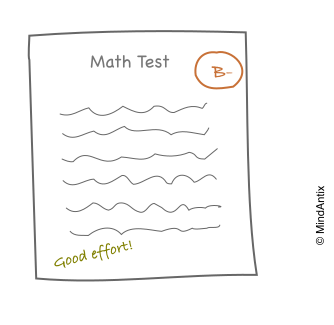Suppose your child comes to you disappointed after receiving a B- on a math test that he worked really hard preparing for. What would you say to him?
If you already know about growth mindset, you know saying something along the lines of, “It’s OK, maybe you are just not a math person” isn’t the smartest thing. You should be focusing on the effort he put in instead of his inherent ability.
How about – “Great effort! I am sure you’ll do better next time”? Would that work better?
Not really.
In general, focusing on effort as opposed to ability increases intrinsic motivation over the long term. However, in certain situations, focusing on effort can actually make things worse. When the work results in a failure, focusing on effort solely can still leave the child feeling inept. Or if effort is overemphasized for relatively easy tasks, children may infer that as a sign of their low ability.
Growth mindset and intrinsic motivation go hand in hand. Children with a growth mindset are more likely to regulate their behavior for intrinsic reasons (e.g. I enjoy doing this activity) whereas children with a fixed mindset are more likely to regulate their behavior for extrinsic reasons (e.g. I want my parents to think I am a good student).
Having a growth mindset is clearly superior to a fixed mindset, since growth mindset enhances intrinsic motivation which in the long term improves perseverance and resilience against failure. But how do you inculcate a growth mindset in your child? If you as a parent model a growth mindset would that rub off on your child?
Carol Dweck, Professor at Stanford, and the originator of the mindset theory of intelligence, found that there is no link between parents’ mind-sets and their children’s. Parents’ own mindsets aren’t generally not visible to their children because they don’t necessarily manifest in parental practices. For instance, parents can have a growth mind-set but still praise their child’s talent, leading their child to develop a fixed mindset.
However, one factor that does influence children’s mindset is not their parents’ intelligence mindset but their parent’s failure mindset. As Carol Dweck explains, “parents can view failure as either enhancing or debilitating, that this belief manifests itself in their reactions to their children’s setbacks, and that it influences their children’s intelligence mind-sets.”
So how can you handle a failure situation more effectively?
When faced with a setback, a better approach is to frame the feedback in a more broader process-oriented feedback that includes thoughtful analysis of strategies and new approaches to explore. Think of the effort-oriented feedback as a subset of the larger process-oriented feedback.
So, instead of simply saying “Good effort!”, use Prof Dweck’s recommendation and try this – “The point isn’t to get it all right away. The point is to grow your understanding step by step. What can you try next?” And follow this up with a discussion of what strategy did not work and what strategies might be worth trying the next time.

